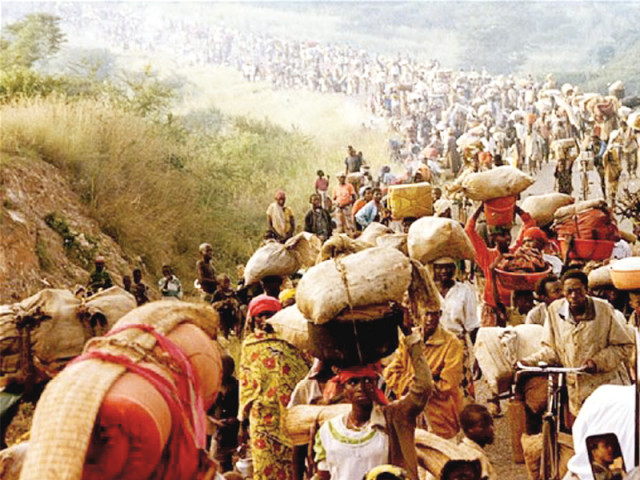Book review: After the War - shadows of a revolution
After The War makes you wonder if mankind is doomed to repeat past mistakes.

Refugees cross the Rusumo border into Tanzania from Rwanda in May, 1994. PHOTO: REUTERS
Editor John Freeman has moved on from the literary magazine, leaving many to wonder about the future of Granta but he has left on a high note of sorts. After the War is one of the strongest editions in the magazine’s long, illustrious and controversial history.
From the world of fiction, acclaimed author Romesh Gunesekera shares a story from his upcoming book Noontide Toll and captures post-war Sri Lanka in a mixture of skepticism, wry humour and rhetorical questions.

Image from Hari Kunzru’s Stalkers.
The story is told from the view of Vasantha, who drives Father Perera and his sidekick, Patrick, from England to Jaffna for a meeting with a military major. The meeting is a ruse while the actual mission is to find proof on the major who once beat up a woman and then left her for dead in his hometown.
Photographer Justin Jin’s Zone of Absolute Discomfort photo essays are visually breathtaking. In the harshest of climate, they document the Russian Arctic and focus on silent faces and greedy governments, as well as the consequences of disastrous environmental policies.
Poet Rowan Ricardo Philllips contributes to this edition with Pax Americana, a poem that leaves you feeling vulnerable as he ends with words that ring in your mind long-after: “Thus the poem, your one true savior, loves you.”
In an excellent, grim, non-fictive essay, British journalist Lindsey Hilsum describes living through genocide as it first began in Rwanda (1994) in The Rainy Season. She returns to Rwanda after a decade and heads to the capital city of Kigali, where the façade of modernity is simply a clue to all that is left unsaid. In the essay, Lindsey says that the genocide first began in 1994 when extremists from Rwanda’s majority ethnic group, the Hutus, targeted the minority group, the Tutsis. The failure of the United Nations made way for the Rwandan Patriotic Front (RPF) that consisted of Tutsis, to end genocide and seize power. The RPF, writes Lindsey, also killed thousands of Hutus, a fact that is omitted in the country’s version of its history. No Rwandan can speak the words Hutu or Tutsi or Twa without invoking the wrath of the law called genocide ideology.
The narrative of Rwanda, through the eyes of those who survived genocide, is filled with a sense of loss, grief and even hope.
This is particularly evident in Rose Birizihiza’s story, a survivor of multiple violations, beginning from spousal rape to the murder of her husband and toddler daughter and sexual slavery for three months. She comes out strong, only to face life head-on as she founds a community for women who have been raped.
In Stalkers, Hari Kunzru reports on the forgotten Chernobyl nuclear accident of 1986 and how the abandoned space in Ukraine is simply known as ‘Zone’. Kunzru sets the narrative apart with a courageous and eerie tone.
With this edition of Granta: 125, the subject of war will be hard to banish to the dark cornerstones of our minds. It is uncomfortable, ugly and will possibly rob you of your sleep, for a little while anyway, and maybe that is its biggest success.
The magazine edition is available at The Last Word for Rs1,250. Maheen Sabeeh is a freelance journalist. She tweets @maheensabeeh
Published in The Express Tribune, Sunday Magazine, February 9th, 2014.



















COMMENTS
Comments are moderated and generally will be posted if they are on-topic and not abusive.
For more information, please see our Comments FAQ